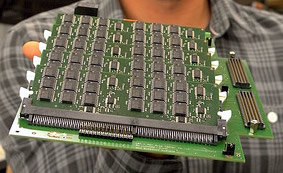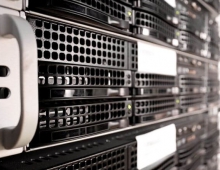
IBM Develops Ultra-fast Phase Change Memory System
A team of Greek IBM scientists in IBNM's research lab in Zurich and a professor from the University of Patras, Greece, borrowed Theseus' name as a codeword for a groundbreaking new memory technology, which combines flash with phase change memory (PCM) on a PCI-e card.
Compared to flash memory, which is ubiquitous in everything from USB sticks to data centers, the PCM memory have clocked 12x and 275x improvements, according to IBM.
Phase-change materials, the premise of the technology, exhibit two metastable states which can store data when placed between two electrically conducting electrodes. When a high or medium current is applied to the material, it can be programmed to write a '0' in the amorphous phase or a '1' in the crystalline phase. A low current is then applied to read out the cells to access the data. Blu-ray discs are an example of a phase change material.
But IBM scientists have bigger plans for phase-change materials than just storing movies. They see it as a critical piece of the overall storage hierarchy to improve the speed and endurance of enterprise-class systems to store and analyze Big Data.
Venerable DRAM, traditional hard disk drives and the flash, each come with their own limitations. DRAM experiences difficulties when scaled beyond 25 nanometers and is expensive per Gigabyte. DRAM also requires significant power consumption and is volatile, so when you unplug your device, you lose everything.
HDDs are mechanical, making them only suitable for certain applications. Additionally, they consume a lot of energy and their normalized I/O throughput (IOPS/GB) is orders of magnitude less that the other memory technologies, and decreasing continuously.
Flash memory has its own scalability problems and when aggressively scaled, it not only scores low in performance, but also in endurance. For example, current consumer class multi-level cell (MLC) flash tops out at 3,000 read/write cycles. This means after rewriting to your USB stick 3,000 times you will notice performance degradation, like lost data and errors. Enterprise class MLC, used for cloud data centers, can be scaled much higher with the support of complex wear-leveling and collection algorithms.
PCM offers excellent and predictable performance in terms of throughput and latency, and high endurance and scalability. For example, when compared to flash, PCM can endure at least 10 million write cycles, but don?t expect PCM to replace flash, the two will work together.
 IBM scientists for the first time demonstrated a hybrid storage and caching subsystem, code-named Project Theseus, at the recent 2014 Non-Volatile Memories Workshop in San Francisco, California.
IBM scientists for the first time demonstrated a hybrid storage and caching subsystem, code-named Project Theseus, at the recent 2014 Non-Volatile Memories Workshop in San Francisco, California.
IBM scientist Ioannis Kolsidas explains, "The technologies are complementary, which is why the Theseus project is so important. We took two very different memory technologies and made them work on an existing PCI-e bus, which can be found on any PC or laptop today, taking it a step closer from demo to deployment."
When tested, the PCI-e card demonstrated remarkable results. In terms of write latency, it completed 99.9% of the requests within 240 microseconds - equal to one millionth of a second. The same experiment, carried out against an enterprise-class PCI-e flash card and a consumer-level flash SSD, yielded a 12x and 275x longer completion times for the best 99.9% of the requests.
Kolsidas and his colleagues are already working on version 2.0 of this PCI-e card and they expect even faster performance with the latest PCM chips.
The team expects PCM to enter the market by 2016 for enterprise class applications like cloud computing and Big Data analytics.
Phase-change materials, the premise of the technology, exhibit two metastable states which can store data when placed between two electrically conducting electrodes. When a high or medium current is applied to the material, it can be programmed to write a '0' in the amorphous phase or a '1' in the crystalline phase. A low current is then applied to read out the cells to access the data. Blu-ray discs are an example of a phase change material.
But IBM scientists have bigger plans for phase-change materials than just storing movies. They see it as a critical piece of the overall storage hierarchy to improve the speed and endurance of enterprise-class systems to store and analyze Big Data.
Venerable DRAM, traditional hard disk drives and the flash, each come with their own limitations. DRAM experiences difficulties when scaled beyond 25 nanometers and is expensive per Gigabyte. DRAM also requires significant power consumption and is volatile, so when you unplug your device, you lose everything.
HDDs are mechanical, making them only suitable for certain applications. Additionally, they consume a lot of energy and their normalized I/O throughput (IOPS/GB) is orders of magnitude less that the other memory technologies, and decreasing continuously.
Flash memory has its own scalability problems and when aggressively scaled, it not only scores low in performance, but also in endurance. For example, current consumer class multi-level cell (MLC) flash tops out at 3,000 read/write cycles. This means after rewriting to your USB stick 3,000 times you will notice performance degradation, like lost data and errors. Enterprise class MLC, used for cloud data centers, can be scaled much higher with the support of complex wear-leveling and collection algorithms.
PCM offers excellent and predictable performance in terms of throughput and latency, and high endurance and scalability. For example, when compared to flash, PCM can endure at least 10 million write cycles, but don?t expect PCM to replace flash, the two will work together.
 IBM scientists for the first time demonstrated a hybrid storage and caching subsystem, code-named Project Theseus, at the recent 2014 Non-Volatile Memories Workshop in San Francisco, California.
IBM scientists for the first time demonstrated a hybrid storage and caching subsystem, code-named Project Theseus, at the recent 2014 Non-Volatile Memories Workshop in San Francisco, California.
IBM scientist Ioannis Kolsidas explains, "The technologies are complementary, which is why the Theseus project is so important. We took two very different memory technologies and made them work on an existing PCI-e bus, which can be found on any PC or laptop today, taking it a step closer from demo to deployment."
When tested, the PCI-e card demonstrated remarkable results. In terms of write latency, it completed 99.9% of the requests within 240 microseconds - equal to one millionth of a second. The same experiment, carried out against an enterprise-class PCI-e flash card and a consumer-level flash SSD, yielded a 12x and 275x longer completion times for the best 99.9% of the requests.
Kolsidas and his colleagues are already working on version 2.0 of this PCI-e card and they expect even faster performance with the latest PCM chips.
The team expects PCM to enter the market by 2016 for enterprise class applications like cloud computing and Big Data analytics.





















